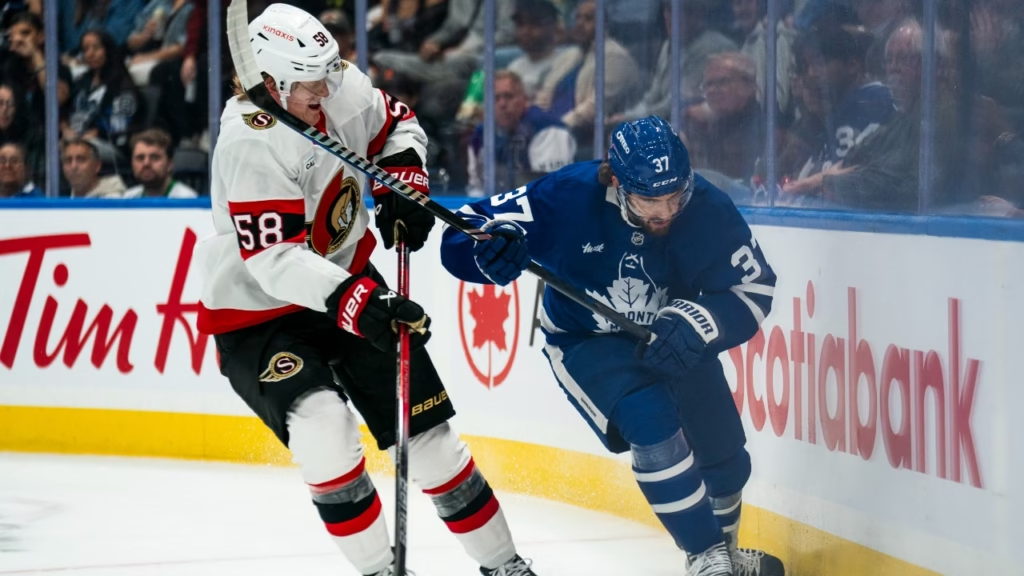OTTAWA — Many hockey players would tell you they prefer to let their play speak for itself, and there might be no better example of that than Carter Yakemchuk.
The shy, polite, soft-spoken defenceman is anything but reserved on the ice with his six-foot-five frame. He has a penchant for physicality that can lead to penalties, but at other times he dazzles with dangles capped off by a booming shot.
Yet heading into training camp, Yakemchuk has one focus he verbalizes with quiet confidence.
“That’s my goal, it’s to make that (Senators) roster,” Yakemchuk told Sportsnet.
Everyone in Sensland remembers Yakemchuk’s pre-season goal against Toronto last year that put him on the NHL radar. His memorable camp didn’t lead to a roster spot, however. Yakemchuk told Sportsnet that camp was an “eye-opener.”
-
32 Thoughts: The Podcast
Hockey fans already know the name, but this is not the blog. From Sportsnet, 32 Thoughts: The Podcast with NHL Insider Elliotte Friedman and Kyle Bukauskas is a weekly deep dive into the biggest news and interviews from the hockey world.
Latest episode
General manager Steve Staios wanted Yakemchuk to develop with his junior team rather than rushing him into the NHL. Unfortunately for Yakemchuk, the results were disappointing.
“Last season was pretty tough on me,” he told Sportsnet. “Obviously, I was a little bit disappointed getting sent back to junior, and then obviously disappointed (about not making) the world junior team.”
Yakemchuk scored fewer points, goals and assists with the Calgary Hitmen than he had the season prior. It wasn’t the set-the-junior-hockey-world-on-fire year he had hoped for. Combined with the letdown of not being invited to play for Team Canada at the world juniors in Ottawa, it was a rough season for the hulking defenceman.
Despite the Senators’ depth on the right side of the blue line, Staios said Yakemchuk’s play in camp will “dictate” if he makes the roster.
Senators director of player development Sam Gagner is a believer.
“He’s got a pro build, and he’s got pro attributes,” said Gagner. “I think he looks great by my eye, and he seems like a man amongst boys in a situation like this. I think the way he plays lends itself to the pro game.”
The hurdles for Yakemchuk are clear: his progress as a skater and his defending.
Dave Bell, coach of the AHL’s Belleville Senators and bench boss of Ottawa’s prospects team this weekend — which Yakemchuk will play for — explained it this way: “I don’t think it’s a secret he’s got to defend.”
In junior hockey, Bell said, Yakemchuk was so dominant, talented and stronger than his competition that he could cheat for offence and not be burned. But in the NHL, he will be.
“That’s probably the biggest area I’ve been looking to improve,” said Yakemchuk, of his off-season focus on defending. “Bear down in the defensive zone. Good defence leads to offence. So that’s probably my biggest thing.”
Defending in the NHL can get easier when you are bigger and stronger. Yakemchuk said he’s gained 10 pounds in the off-season, training with Jordan Eberle in Calgary, where he is a native son.
But doesn’t adding muscle make it harder to become a faster skater?
“Being able to put on muscle in the gym, I think it helps with my speed, building more power in my legs,” he said. “I did a lot of power skating throughout the summer, which is how I was trying to improve.”
Defencemen need to defend, but sometimes offence can hide deficiencies in a player’s own end. When Erik Karlsson started in Ottawa, there were plenty of mistakes, but also unbelievable rewards.
Not that Yakemchuk is likely to be a Karlsson — few are — but the key to success for offensive defencemen isn’t talent alone. It’s the ability to manage defensive mistakes in the pursuit of offensive creativity.
“I think it’s a great thing,” said Bell, about Yakemchuk’s confidence. “You see young guys make mistakes and they turn a bad shift into a bad period, then it turns into a bad game. Yakemchuk can make a mistake and he just goes on the next shift and he’s a new player.
“You don’t know if he’s had a bad game or a good game,” Bell added. “He just says, ‘Good morning.’ He could have scored three goals. He’ll say, ‘Good morning.’ Could have been a minus-five. Still says, ‘Good morning.’”
It’s a simple mantra Yakemchuk says he lives by.
“You never want to get too up or too down,” he said.
But it’s definitely offence that sparks enthusiasm in the stoic young man.
Yakemchuk’s smile lit up when asked about how he wants to become a better offensive player.
“Working on a quicker release,” he said. “That’s something I want to improve on. Just being able to get it off my stick faster.”
“I’m willing to take shots from anywhere,” he said. “My shot is one of my strengths on the ice, being able to just shoot it from anywhere and it has a chance of going in.
“It’s a pretty good feeling to get a hold of one (a slapshot), especially if it goes in, so it feels pretty good,” he added with a grin.
Yakemchuk has a cannon from the point, but the age of slapshots has largely passed in the NHL. Many players now prefer accuracy over sheer power.
“I think snapshots and wrist shots are probably the most important shots,” said Yakemchuk.
The hope for the youngster is that his work on his snapshot makes him a triple threat with an elite slapshot, snapshot and backhand — all of which he believes can do damage at the next level.
“I think all of my shots are pretty strong,” said Yakemchuk.
Be on the lookout for some hot vulcanized rubber in training camp and pre-season from Yakemchuk in his second rodeo in Ottawa.
Discover more from 6up.net
Subscribe to get the latest posts sent to your email.


